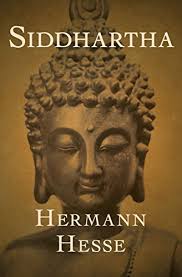Siddhartha Page #13
Siddhartha is a novel by Hermann Hesse that deals with the spiritual journey of self-discovery of a man named Siddhartha during the time of the Gautama Buddha. The book, Hesse's ninth novel, was written in German, in a simple, lyrical style.
Kamala listened to him. She loved his voice, she loved the look from his eyes. "Perhaps it is so," she said quietly, "as you say, friend. But perhaps it is also like this: that Siddhartha is a handsome man, that his glance pleases the women, that therefore good fortune is coming towards him." With one kiss, Siddhartha bid his farewell. "I wish that it should be this way, my teacher; that my glance shall please you, that always good fortune shall come to me out of your direction!" WITH THE CHILDLIKE PEOPLE Siddhartha went to Kamaswami the merchant, he was directed into a rich house, servants led him between precious carpets into a chamber, where he awaited the master of the house. Kamaswami entered, a swiftly, smoothly moving man with very gray hair, with very intelligent, cautious eyes, with a greedy mouth. Politely, the host and the guest greeted one another. "I have been told," the merchant began, "that you were a Brahman, a learned man, but that you seek to be in the service of a merchant. Might you have become destitute, Brahman, so that you seek to serve?" "No," said Siddhartha, "I have not become destitute and have never been destitute. You should know that I'm coming from the Samanas, with whom I have lived for a long time." "If you're coming from the Samanas, how could you be anything but destitute? Aren't the Samanas entirely without possessions?" "I am without possessions," said Siddhartha, "if this is what you mean. Surely, I am without possessions. But I am so voluntarily, and therefore I am not destitute." "But what are you planning to live of, being without possessions?" "I haven't thought of this yet, sir. For more than three years, I have been without possessions, and have never thought about of what I should live." "So you've lived of the possessions of others." "Presumable this is how it is. After all, a merchant also lives of what other people own." "Well said. But he wouldn't take anything from another person for nothing; he would give his merchandise in return." "So it seems to be indeed. Everyone takes, everyone gives, such is life." "But if you don't mind me asking: being without possessions, what would you like to give?" "Everyone gives what he has. The warrior gives strength, the merchant gives merchandise, the teacher teachings, the farmer rice, the fisher fish." "Yes indeed. And what is it now what you've got to give? What is it that you've learned, what you're able to do?" "I can think. I can wait. I can fast." "That's everything?" "I believe, that's everything!" "And what's the use of that? For example, the fasting--what is it good for?" "It is very good, sir. When a person has nothing to eat, fasting is the smartest thing he could do. When, for example, Siddhartha hadn't learned to fast, he would have to accept any kind of service before this day is up, whether it may be with you or wherever, because hunger would force him to do so. But like this, Siddhartha can wait calmly, he knows no impatience, he knows no emergency, for a long time he can allow hunger to besiege him and can laugh about it. This, sir, is what fasting is good for." "You're right, Samana. Wait for a moment." Kamaswami left the room and returned with a scroll, which he handed to his guest while asking: "Can you read this?" Siddhartha looked at the scroll, on which a sales-contract had been written down, and began to read out its contents. "Excellent," said Kamaswami. "And would you write something for me on this piece of paper?" He handed him a piece of paper and a pen, and Siddhartha wrote and returned the paper. Kamaswami read: "Writing is good, thinking is better. Being smart is good, being patient is better." "It is excellent how you're able to write," the merchant praised him. "Many a thing we will still have to discuss with one another. For today, I'm asking you to be my guest and to live in this house." Siddhartha thanked and accepted, and lived in the dealers house from now on. Clothes were brought to him, and shoes, and every day, a servant prepared a bath for him. Twice a day, a plentiful meal was served, but Siddhartha only ate once a day, and ate neither meat nor did he drink wine. Kamaswami told him about his trade, showed him the merchandise and storage-rooms, showed him calculations. Siddhartha got to know many new things, he heard a lot and spoke little. And thinking of Kamala's words, he was never subservient to the merchant, forced him to treat him as an equal, yes even more than an equal. Kamaswami conducted his business with care and often with passion, but Siddhartha looked upon all of this as if it was a game, the rules of which he tried hard to learn precisely, but the contents of which did not touch his heart. He was not in Kamaswami's house for long, when he already took part in his landlords business. But daily, at the hour appointed by her, he visited beautiful Kamala, wearing pretty clothes, fine shoes, and soon he brought her gifts as well. Much he learned from her red, smart mouth. Much he learned from her tender, supple hand. Him, who was, regarding love, still a boy and had a tendency to plunge blindly and insatiably into lust like into a bottomless pit, him she taught, thoroughly starting with the basics, about that school of thought which teaches that pleasure cannot be taken without giving pleasure, and that every gesture, every caress, every touch, every look, every spot of the body, however small it was, had its secret, which would bring happiness to those who know about it and unleash it. She taught him, that lovers must not part from one another after celebrating love, without one admiring the other, without being just as defeated as they have been victorious, so that with none of them should start feeling fed up or bored and get that evil feeling of having abused or having been abused. Wonderful hours he spent with the beautiful and smart artist, became her student, her lover, her friend. Here with Kamala was the worth and purpose of his present life, nit with the business of Kamaswami. The merchant passed to duties of writing important letters and contracts on to him and got into the habit of discussing all important affairs with him. He soon saw that Siddhartha knew little about rice and wool, shipping and trade, but that he acted in a fortunate manner, and that Siddhartha surpassed him, the merchant, in calmness and equanimity, and in the art of listening and deeply understanding previously unknown people. "This Brahman," he said to a friend, "is no proper merchant and will never be one, there is never any passion in his soul when he conducts our business. But he has that mysterious quality of those people to whom success comes all by itself, whether this may be a good star of his birth, magic, or something he has learned among Samanas. He always seems to be merely playing with out business-affairs, they never fully become a part of him, they never rule over him, he is never afraid of failure, he is never upset by a loss."
Translation
Translate and read this book in other languages:
Select another language:
- - Select -
- 简体中文 (Chinese - Simplified)
- 繁體中文 (Chinese - Traditional)
- Español (Spanish)
- Esperanto (Esperanto)
- 日本語 (Japanese)
- Português (Portuguese)
- Deutsch (German)
- العربية (Arabic)
- Français (French)
- Русский (Russian)
- ಕನ್ನಡ (Kannada)
- 한국어 (Korean)
- עברית (Hebrew)
- Gaeilge (Irish)
- Українська (Ukrainian)
- اردو (Urdu)
- Magyar (Hungarian)
- मानक हिन्दी (Hindi)
- Indonesia (Indonesian)
- Italiano (Italian)
- தமிழ் (Tamil)
- Türkçe (Turkish)
- తెలుగు (Telugu)
- ภาษาไทย (Thai)
- Tiếng Việt (Vietnamese)
- Čeština (Czech)
- Polski (Polish)
- Bahasa Indonesia (Indonesian)
- Românește (Romanian)
- Nederlands (Dutch)
- Ελληνικά (Greek)
- Latinum (Latin)
- Svenska (Swedish)
- Dansk (Danish)
- Suomi (Finnish)
- فارسی (Persian)
- ייִדיש (Yiddish)
- հայերեն (Armenian)
- Norsk (Norwegian)
- English (English)
Citation
Use the citation below to add this book to your bibliography:
Style:MLAChicagoAPA
"Siddhartha Books." Literature.com. STANDS4 LLC, 2024. Web. 24 Dec. 2024. <https://www.literature.com/book/siddhartha_24>.




Discuss this Siddhartha book with the community:
Report Comment
We're doing our best to make sure our content is useful, accurate and safe.
If by any chance you spot an inappropriate comment while navigating through our website please use this form to let us know, and we'll take care of it shortly.
Attachment
You need to be logged in to favorite.
Log In